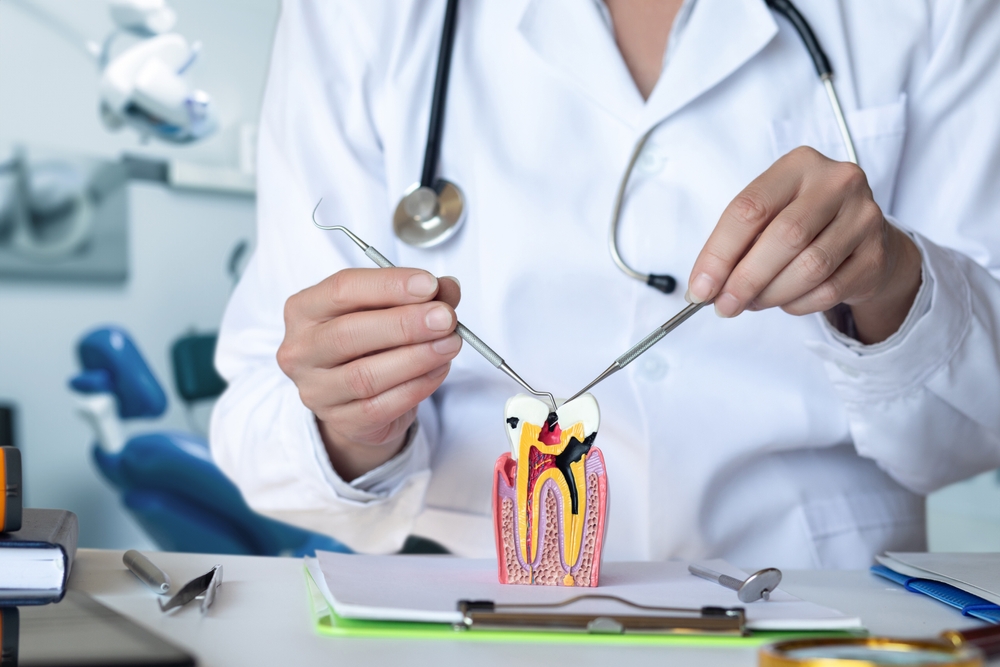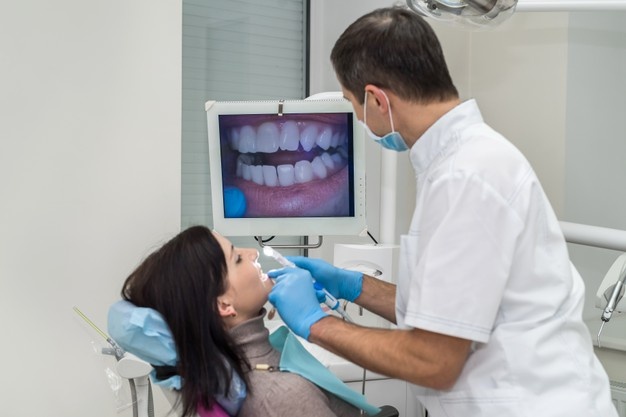1812 E. Broadway St.
Pearland, TX 77581
The term “root canal” shouldn’t send shivers down your spine. At Pearland Dental Group, Dr. Rushi Dave and Dr. Mili Shah are transforming this often-misunderstood procedure into a positive, pain-relieving experience.
Using state-of-the-art dental technology and gentle techniques, our doctors have helped countless patients throughout Pearland, Bellaire, Galena Park, and Pasadena discover that modern root canal therapy isn’t just comfortable—it’s often the key to immediate relief, severe tooth decay solutions, and long-term dental health. Our Pearland dentists don’t just treat infections with root canals; we partner with our patients to preserve their natural teeth and restore their confidence in dental care.
Experiencing dental pain or thinking you may need a root canal? Don’t wait until it becomes severe. Contact Pearland Dental Group, your Brazoria County dental practice at (281) 993-9900 for prompt attention to your concerns.
Temperature sensitivity is one of the many possible signs you need a root canal:
Changes in the gum tissue around an affected tooth provide evidence of infection and a possible need for a root canal procedure:
Physical changes to your tooth’s appearance often reflect internal damage:
When a tooth infection becomes severe, it can affect your overall health:
Experiencing any of these symptoms? Don’t wait for them to worsen. Contact Pearland Dental Group immediately at (281)993-9900 for evaluation and treatment. Our team provides emergency care to address serious dental infections before they progress.
When it comes to root canal treatment, technology and timing make all the difference. At Pearland Dental Group, we’ve revolutionized the diagnostic process by combining state-of-the-art 3D imaging, microscope-assisted examinations, and low-radiation digital X-rays with our doctors’ decades of experience.
Dr. Dave and Dr. Shah utilize this advanced technology suite to create precise, personalized treatment plans that take the guesswork out of root canal therapy. Plus, with our emergency consultation and same-day appointment availability, you’ll never have to endure dental pain longer than necessary.
Our team takes pride in explaining every step of your treatment in clear, relatable terms, ensuring you feel informed and at ease throughout your visit. When you choose Pearland Dental Group for your root canal therapy, you’re not just getting a procedure – you’re getting a partner in your dental health journey.
Ready to experience truly modern dental care? Call (281)993-9900 to schedule your root canal consultation today.
Regular dental check-ups form the cornerstone of preventive care, acting as your first line of defense against potential dental infections. Through advanced screening technology and professional skill, we can identify early warning signs that might go unnoticed at home.
During these visits, our team removes hardened plaque (calculus) that can’t be eliminated through regular brushing, while also evaluating any patterns of teeth grinding and assessing the integrity of existing dental work. This proactive approach allows us to address minor issues before they develop into major concerns requiring extensive treatment.
Preventive dentistry goes beyond basic cleanings at Pearland Dental Group. We offer a comprehensive suite of protective measures designed to fortify your dental health. Custom-fitted night guards provide essential protection for patients who grind their teeth, while professional-grade fluoride treatments strengthen enamel against decay.
For patients with deep grooves in their teeth, dental sealants offer an additional barrier against cavity-causing bacteria. High-risk patients benefit from targeted antimicrobial treatments that help maintain optimal oral health between dentist visits.
Your daily oral care routine plays a crucial role in preventing dental infections. We recommend using electric toothbrushes for their superior plaque-removing capabilities, combined with proper flossing techniques to clean between teeth where decay often begins.
Regular use of antimicrobial mouth rinses provides an extra layer of protection against harmful bacteria, while proper tongue cleaning reduces the overall bacterial load in your mouth. This comprehensive approach to home care significantly reduces your risk of developing dental infections.
Small changes in your daily habits can have a significant impact on your dental health. Implementing stress management techniques helps reduce teeth grinding, while mindful dietary choices limit exposure to harmful acids that can weaken tooth enamel.
Maintaining proper hydration supports healthy saliva flow, your body’s natural defense against oral bacteria. We emphasize the importance of addressing dental pain or sensitivity promptly, as these early warning signs often indicate developing problems that are easier to treat when caught early.
For our active patients, sports safety requires special attention to dental protection. Custom-fitted athletic mouth guards provide superior protection compared to over-the-counter options, effectively preventing sports-related dental injuries.
Regular inspection of protective gear ensures continued effectiveness, while having established emergency protocols means you’re prepared if accidents occur. We emphasize the importance of immediate evaluation following any dental trauma, as quick intervention can often save damaged teeth.
Patients with underlying health conditions require specialized preventive care plans. For diabetic patients, we recommend more frequent check-ups to monitor oral health, as diabetes can significantly impact healing and infection resistance.
Immunocompromised individuals receive specialized cleaning protocols to minimize infection risk, while pregnant patients benefit from modified treatment schedules that accommodate their changing needs. We maintain close coordination with your medical providers to ensure comprehensive care that considers all aspects of your health.
Different life stages present unique challenges for dental health. Seniors with reduced dexterity may require modified cleaning techniques and tools, while patients undergoing orthodontic treatment need additional protection measures.
Hormonal changes during various life stages can affect oral health, requiring adjusted care protocols. For patients with arthritis or other mobility issues, we provide specialized tools and techniques to maintain effective daily oral care despite physical limitations.
Ready to develop your personalized prevention plan? Contact Pearland Dental Group at (281)993-9900 to schedule your comprehensive evaluation.
At Pearland Dental Group, Dr. Dave and Dr. Shah take a proactive stance on preventing dental infections. We create customized prevention plans based on your specific risk factors, lifestyle, and health conditions. Our team uses advanced diagnostic tools to identify potential problems before they become serious, and we provide detailed guidance on home care techniques tailored to your needs.
Take control of your dental health today. Contact Pearland Dental Group at (281)993-9900 to schedule your preventive care appointment.
Postponing necessary root canal treatment can lead to severe complications that extend far beyond tooth pain. The infection can spread to surrounding tissue, potentially causing bone loss in your jaw and creating abscesses that can be life-threatening if left untreated.
Additionally, the longer you wait, the more likely you’ll need extensive reconstruction or even tooth extraction. In some cases, the infection can spread to other parts of your body through your bloodstream, potentially affecting your heart, brain, and other vital organs. Early intervention not only saves your tooth but also protects your overall health.
Regular tooth sensitivity typically comes and goes quickly, lasting only a few seconds when triggered by hot, cold, or sweet stimuli. However, when root canal treatment is needed, the sensitivity often persists for several minutes or even hours after the stimulus is removed.
The pain may also occur spontaneously without any trigger. Additionally, root canal-related sensitivity often involves a deep, throbbing sensation rather than the sharp, quick zinging associated with typical sensitivity.
The presence of other symptoms like gum swelling, tooth discoloration, or persistent bad taste can also help distinguish between regular sensitivity and the need for root canal therapy.
Several key indicators suggest a dental infection has spread beyond the confines of your tooth. First, you might experience facial swelling, particularly around the affected tooth or in your jaw, cheek, or neck area.
A fever accompanied by dental pain is another serious warning sign that requires immediate attention. You might also notice increased lymph node swelling under your jaw or in your neck, difficulty swallowing, or general fatigue and malaise. Some patients report a bitter or metallic taste in their mouth, which can indicate the presence of infection-related drainage.
If you experience any of these symptoms, especially in combination, contact our office immediately at (281) 993-9900 for emergency care.
Don’t let fear or uncertainty prevent you from getting the treatment you need. The experienced team at Pearland Dental Group, serving Pearland, Bellaire, Galena Park, and Pasadena, is ready to provide comfortable, effective root canal therapy using the latest techniques and technology. Take the first step toward relief – call (281)993-9900 to schedule your root canal consultation with Dr. Dave or Dr. Shah.




Our clinic offers all kinds of services and constantly study new
technology to add new custom services to the list
Phone: (281)993-9900
Address: 1812 E. Broadway St. Pearland, TX 77581
Copyright © 2021 Pearland Dental Group | Managed by Now Media Group